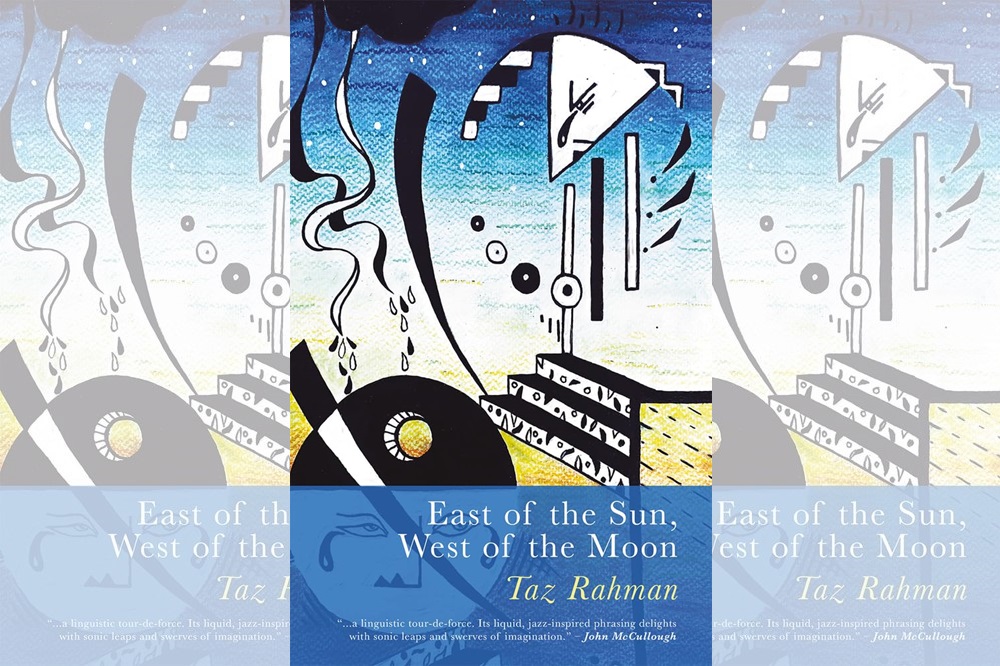Poetry review: East of the Sun, West of the Moon by Taz Rahman

CJ Wagstaff
In East of the Sun, West of the Moon, Taz Rahman pulls together the threads of a devoted practice to present a work of true linguistic sensitivity.
In this long-awaited debut collection, the Cardiff local looks beyond the city’s bricks and mortar to find something more meaningful in the urban sprawl.
With a deeply attentive eye, Rahman conjures the edge-lands of a city stippled with concealed green space as he walks around the capital by himself.
From city parks and cemeteries to the banks of the Taff and Ely rivers, we see the walking body used as a vehicle for meditation as the artist examines his tangible connection to place.
Sense and sensuality
From the book’s first pages, Rahman establishes a sure command of sense and sensuality, creating a striking thematic depth.
The opening lines of ‘Yashica 365’ drip with pining allusions to guava, sofeda and jackfruit, and the reader is summoned to taste, feel and desire along with the poet as he finds resonance in the neural stimuli of the world.
Similarly, the persona poem ‘Sanctuary’ bursts with flavour as Rahman tells the story of a displaced food delivery rider finding a home in Cardiff. T
he reader’s senses are alerted to fragrant mint, basil and peppery galangal root, cultivating an immersion into the diasporic world of the speaker.
The work is also flecked with linguistic artefacts of the poet’s own lived experience. With Yashica 365’s ‘Langra aam’ and ‘Moulvibazar tea’, an introduction is made to Rahman’s Dhaka heritage.
In Butter, we taste shingara and tikia and smell coconut oil in his mother’s hair as he weaves together his personal and cultural histories.
There is a vitality to these poems which is exacted by Rahman’s invocation of the senses.
Razor-sharp
The artist renders images with razor-sharp precision, at once questioning the complexities of being and showcasing a sophisticated visual acuity.
With a past life in wedding and events photography, it is no surprise that seeing is a core facet to this many-sided gem.
In ‘The Nearness of You,’ for example, this skill is actuated to bring a Cathays cemetery to verdant life, “daub pathways in ash, rowan, hazel, let jays fatten / on nuts”. In ‘Chocolate,’ the river Ely is manifested clear as glass.
This visual understanding flourishes when the poet alludes to articles with cultural significance. In ‘Muktijoddha,’ we see the blood-red joba-phul flower; in ‘Yashica 365,’ the hand-woven katha.
Through this lexis of material heritage, a lush and distinctive sound-world is also created with a unique timbre.
In naming these objects, Rahman authentically conveys the complexities of place and selfhood as experienced by someone with proximity to the immigrant identity.
Sonic loveliness
Jazz pierces the heart of this book. In ‘Strange Fruit,’ the poet invokes the rattle of “Gene Krupa / dragging one stick across the snare head”, while the poem’s enjambed stanzas meander like a walking bassline across pages.
Like jazz, too, this book’s soulful expression of the personal unpacks universal truths of human experience: love, loss, longing and grief are recurring motifs in the work.
In this rich tapestry of language and sound, readers are welcomed on a lyrical journey as varied and enduring as its musical counterpart.
These thirty-one poems channel a musicality at every turn, with assertive syntactical pulse and a playful and improvised figurative output.
The sustained sonic loveliness of this work does occasionally mystify its semantic sense. Where Rahman looks to flex his lexical intellect, the imagery leans into hazy reverie. But I would not be hasty to render this a failing.
In these moments, the collection extends an invitation to work for the poem’s truth: to spend time within its world, to become intimately acquainted with its philosophy. Where the reader commits to excavating meaning, they are sure to yield a far sweeter fruit.
Earthly detail
Where the collection really sings is in its concrete and precise invocation of memory. Rahman recalls the specificities of time and place with incisive focus, animating the poems with practiced and economic precision.
By grounding the ineffable in earthly detail, the poet reveals the far through the nuanced lens of the near. When ‘Internal Reliquary,’ for example, turns its eye to a “room too safe” above an Albany Road chicken shop, we recognise much broader ideas about the human condition.
References to the body are equally tactile. In ‘Drama/Trauma,’ familial relationships are illuminated with meticulous detail: “butter / beats in the back / of Baba’s hand”.
This close sensitivity towards the physical reveals the intimate knowing shared between loved ones.
Where the speaker looks to his own self and body, he fosters emotional proximity to the reader. In ‘Bread of Heaven,’ we encounter the familiar ritual of the shower where “bubbles forage the navel”.
The collection also explores the tongue in its many applications: working its way around a second language, or in ‘I Want to See Your Face in Every Kind of Light,’ engaged in a “mindless tangle” with another.
In the book’s first poem, the curtains from Rahman’s childhood memory “unfurl a decade”. In the same way, this book unfurls a lifetime of noticing and feeling with acute clarity.
This is a thing of tenderness, of honesty, and of keen introspection that poses a fine addition to contemporary Welsh poetry.
East of the Sun, West of the Moon is the calling card of an artist in the genesis of his poetic fortune.
East of the Sun, West of the Moon by Taz Rahman is published by Seren. It is available from all good bookshops.
Support our Nation today
For the price of a cup of coffee a month you can help us create an independent, not-for-profit, national news service for the people of Wales, by the people of Wales.





